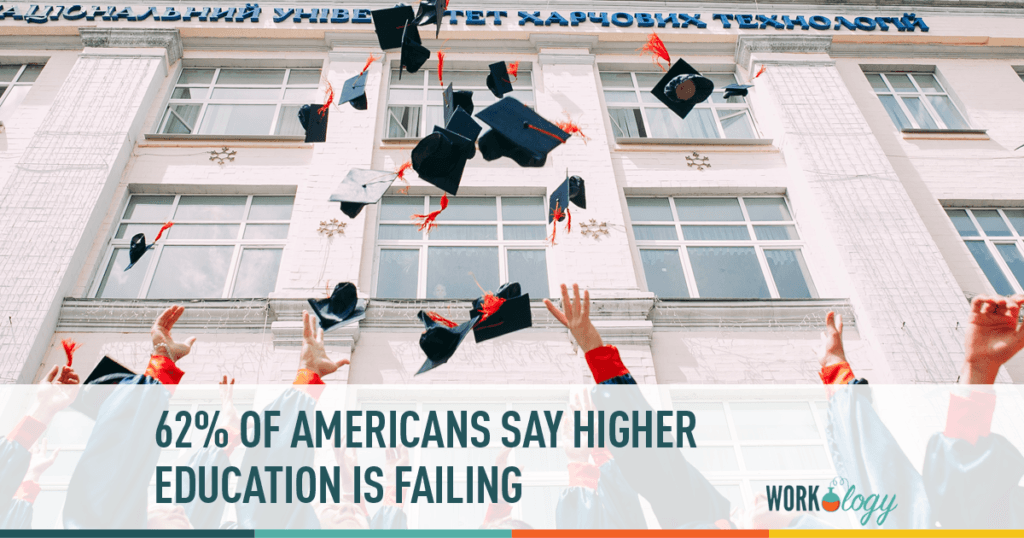Job seekers and industry leaders alike seem to be in constant debate over the importance of a college degree. Is higher education really worth all of the debt? Is it worth more than hands-on experience? According to a recent survey conducted by Northeastern University, 62 percent of Americans say the higher education system is currently doing only a fair to poor job of preparing college graduates.
Americans still believe a job seeker’s level of education is the most important factor of success in the job market. It lands ahead of of global economic forces and personal characteristics like socioeconomic status, nationality, and race. Despite Americans’ belief in the importance of higher education, most believe it is not doing all it can to prepare graduates for success in the workforce.
Higher Education is Outdated.
According to the survey, nearly half of all Americans say colleges are not in tune with today’s job market, and therefore are not properly preparing graduates. In a such a competitive and rapidly changing job market, colleges are sending graduates into the world with outdated skills and techniques.
This goes for job search techniques, as well as major-related skills. Students are learning about skills that have worked in the past, rather than the skills needed in the future.
A Narrow Focus on STEM.
Another problem with higher education is its focus on STEM degrees. According to the survey, most Americans place a higher value on soft skills, like problem solving and communication, than technical skills.
Nearly three in four business leaders believe job seekers should be well-rounded with a range of abilities, rather than focus specific industry expertise. In fact, less than half of say it’s more important to have skills in math, science, or technology than to be creative or abstract thinkers.
Experience Over Education.
Because of the noticeable problems with higher education, many Americans believe the key to long-term career success is the experience gained outside of the classroom. Business leaders agree that expanding professional work programs for students is the single most important step we can take to better prepare graduates for the workforce, according to the survey.
Much of this experience comes in the form of student internships. Nearly 90 percent of Americans believe students with work experience from an internship or paid employment related to their field will have more successful careers in the long-term. Of those that gained work experience during college, 82 percent say it was their most valuable experience. Internships allow students to gain both personal and professional development.
Despite the fact that Americans agree on the importance of hands-on experience, they still aren’t sure who should take responsibility for giving them these opportunities.
Americans are split pretty evenly between placing the responsibility on employers (36 percent), the graduates themselves (35 percent), and colleges (29 percent). Each can provide graduates with some of the tools for success in the workplace.
Nearly nine in 10 Americans believe the higher education system must change to better assist graduates in entering today’s competitive workforce. The responsibility must be shared if we want to see a difference in tomorrow’s graduates.
What do you think needs to change to better prepare graduates for the competitive workforce?










One Comment
Great article, thank you for sharing this. It seems that the debate over education vs. experience is ongoing. In my experience, and in my business, continuing education and professional development are ongoing. They start essentially right when we begin our careers, whatever that may be. Enhancing the learning experience is important not only to ensure graduates are equipped with the needed skills for the workforce, but also for engagement in the learning process. Having both taught and developed curriculum for post secondary institutions, the challenge is always in bridging the links in learning from theory to practice. In continuing education training, it is assumed that the participants have the basics of learning down from having some type of academic background, whether it is from a technical college or formal degree program. These assumptions often miss those with qualifications beyond those acquired in a classroom environment. With the growth of online learning though, people can get an education that is somewhat formalized in terms of how it is delivered, the beliefs around online learning and the broad spectrum of certifications that can be obtained from an online learning centre. This opens the doors of the workforce and corporate ladders for those who maybe don’t necessarily have the formal education and degree, as well as those who may have a formal academic degree, but want to change careers and acquire the skills needed to do so. The imagination is the limit nowadays and it is nice to see a post about the general attitudes about education and experience.
Suzanne
Brain Jacks Inc.
Comments are closed.